- Home
- John Barth
The Floating Opera Page 20
The Floating Opera Read online
Page 20
“Are you Captain Adam?”
“That’s a fact, sir. Jacob Adam. Bring yer little girl along now, I’ll show ye the boat. Quite a boat, ain’t she?”
“She is indeed.”
“Quite a boat, sir,” Capt. Adam agreed. “Thirty-one years old, and she’s still sound as a dollar, if you know what I mean—” He tugged my arm and chortled. “Dollar ain’t worth what it was in 1906!
“Quite a boat,” he said again. “Had ’er built in Little Washington, North Carolina, in 1906, sir, and I had ’er built strong. Why, you set one o’ them Miss’ssippi showboats down in the ocean for a minute, there wouldn’t be a stick left fit to pick yer teeth with.”
“Why?” Jeannine demanded, gaining courage.
“Did you use to run boats on the Mississippi?” I asked.
“No, sir, I don’t mind tellin’ ye,” the Captain declared, “I never set foot on a boat in my life till I built the Op’ry. Not even a row-skiff; now, then. I run a two-car ten-cent vaudeville show all over the country, sir, from 1895 till 1905, and did so good I had to quit, ’cause ever’body I hired cut out to start a ten-cent show hisself. Next thing I knew there was so much competition I couldn’t make the nut. I figured I’d set me up in something that takes a big wad to start with, so ever’ Tom, Dick, and Harry with ten bucks and a lot o’ brass can’t squeeze in. I don’t mind tellin’ ye, I sunk sixty thousand dollars in this showboat, sir, in a time when dollars was dollars, I mean. But I wanted ’er tough, and I still got ’er.”
“She looks plenty sturdy,” I admitted. So far we hadn’t moved from the gangplank: there is that in me which brings out old men’s garrulity.
“She is sturdy, sir. Ye see them strakes along the sides there?” He pointed to the barge’s side planking. “First time I saw them boards, they was trees. I walked around the Carolina woods for a year, sir, pickin’ out my timber where it stood. Hundred-and-twenty-two-foot long and four inches thick, them strakes, and not a splice in ’em from stem to stern, nor a knot, either. And I got ’em drift-bolted ever’ two feet with twenty-seven-inch bolts. That’s for the ocean, sir! Thirty-two-foot planks across the bottom, beam to beam; not a splice. Cost me plenty, sir, but it was money well spent, let me tell you. One time in 1920 we was caught in a small squall in Tangier Sound, and they couldn’t get a boat to us. I’m not lyin’, sir, for fourteen hours the waves was breakin’ over the Op’ry’s roof. Took Mrs. Adam’s pansies right out o’ the window box up there, but the Op’ry didn’t spring a plank. That’s what plannin’ does, sir!”
Jeannine was jumping up and down; I moved toward the shuttered box office.
“Come on inside,” the Captain invited. We entered the theater, dark and cool, and Capt, Adam provided us with a running commentary on what we were observing.
“Seats seven hundred,” he said. “White folks down here and in the boxes, colored folks in the balcony.”
Jeannine, happily, didn’t ask why.
“Used to be, couldn’t get a darkie on board,” he went on. “Word got around we was baitin’ ’em on to send back to Africa. (That there stage is nineteen foot across; hall’s eighty foot long.) Used to carry a car on board, but the salt water ruined ’er, seemed like.”
“Where’s your house?” Jeannine demanded.
“Well, little lady, I live up on the roof.”
“Why?”
“Why? Heh! She’s a fresh one, ain’t she? Well, sir, come on back here with me, I’ll show ye the dressin’ rooms and all.”
We followed the Captain behind the stage, where a row of numbered doors ran along a short hallway.
“Good big dressin’ rooms,” Capt. Adam said proudly. “The actors live in ’em, too. Most ever’body’s into town just now, sir.”
“Why?” Jeannine murmured.
“Now come on down here.” We were led down a companionway. “Here’s the cook’s quarters and the dinin’ room—we’re right under the stage now—and over there’s the galley. Bottle-gas stove and a nine-hundred-pound icebox. That there door leads right out to the orchestra pit. What ye think of ’er?”
“Very impressive,” I said.
“Whole shebang don’t draw but fourteen inch o’ water, by golly. I always say, ‘You give me a good-size mud puddle, I’ll give you a show!’ Yes, sir. Six big ventilators up on the roof. Runnin’ water in all the dressin’ rooms. Plenty o’ heat in the wintertime. See them pipes runnin’ under the stage? Heat pipes, water pipes, acetylene pipes for the footlights.”
“You don’t use electricity?”
“I use it for the ventilators and lights too, when I can, but ye can’t depend on it. Lots o’ landings ain’t electrified. Ye can give a show without ventilators, but not without lights. I carry two banks o’ footlights, one electric and one acetylene.”
I remarked that acetylene seemed a dangerous shipmate to me.
“No sirree!” Capt. Adam denied. “Never had a speck o’ trouble. Got the tanks rigged outside, where a leak won’t cause no trouble, and I just run it in through this little copper line here”—he indicated with his ringer a small pipe leading through a valve, from which hung a sign reading DO NOT OPEN UNTIL READY TO LIGHT FOOTLIGHTS—“and out to the foots. The rig works fine. Don’t ye worry, sir; ain’t nothin’ about this boat that ain’t been thought out plenty careful. Got a tug bow and stern, so she rides steady in a seaway. Got our circuit figured so we hit fresh water twice a year, to kill off the moss and barnacles on the bottom. Start out from Elizabeth City, North Carolina (fresh-water town), soon’s it gets warm, and play up along Albemarle Sound, Pamlico Sound, through the Dismal Swamp Canal, and up the Chesapeake far as Port Deposit, hittin’ all the best landings on the way. That’s fresh water up by Port Deposit, so we head back home with a clean bottom again. Saves me a haulin’ out.”
Jeannine had begun to swing back and forth on my hand. I thanked Capt. Adam for showing us around his craft, and he ushered us through a side door that led from the dining room, where we’d been standing, to the starboard quarter of the barge.
“Did you like the showboat?” I asked Jeannine.
“All right.” Her face was flushed, and I thought it best to get her out of the sun.
We passed the refreshment stand, unoccupied except for the vendor himself.
“Toddy honey, will you buy me another ice-cream cone?”
“Why?”
“I want one, honey.”
“Why?”
“I want one.”
“Why do you want one?”
“I want one.”
“But why? Tell me why.”
“I want one.”
She got one, and we strolled back to the office in all the heat and light.
XXIII. so long, so long
Before we reached Court Lane, Jeannine’s second ice cream cone was dripping from brown chin and dimpled elbow, down her sundress and onto her sneakers. I paused under a great poplar tree to scrub her up a bit with my handkerchief. My head felt a little dizzy—whether from the sun or from Jeannine’s questions, I couldn’t say.
“Toddy, honey, I got to sit on the potty,” she now remarked.
“Can you hold on a minute?” I grinned, hoping she wouldn’t start asking why.
I picked her up and strode quickly up the sidewalk, expecting at any moment to have my coat sleeve moistened, but Jeannine chuckled and clung to my neck, her fat little arm over my mouth.
“Mmm, you smell like your mommy,” I said.
This amused her. “You smell like my daddy,” she countered.
“Ah.”
We reached port safely, and Mrs. Lake took Jeannine to the lavatory. I spent the time writing a note to Jimmy Andrews, who stood not ten feet from me, and thinking about Jeannine, whose opinion it was that I smelled like her daddy. Possibly, of course, she was right: I could certainly smell some Andrews in her infant curiosity.
I finished the note (which informed Jimmy of the letter from Eustacia Callader and instructed him to institute procee
dings against Harrison’s mother for recovery of that part of the estate which she’d disposed of) and put it in my inside coat pocket. A few minutes later Jane came in, her hair cropped short, and we left to go to her place for cocktails. I didn’t bother to straighten out my desk, to say a last goodbye to Mr. Bishop, Jimmy, or Mrs. Lake, or even to take a final look at my office, at my wonderful staring-wall. Why should I?
On the drive to East Cambridge, although I chatted amiably with Jane and Jeannine, I was filled with my plan, which had crystallized by then into its final form. If out of my meager vocabulary only the term unenthusiastic excitement comes anywhere near describing the feeling with which all my thoughts were suffused, you must resolve my meaning from that term’s dissonance. There remained still no small measure of the excitement which had attended my first realization that I was ready to destroy myself; but, like all my major decisions of policy, that resolution had been a rapid one, the effect of external impingement upon whatever was my current mask—and as in those other cases, the resolution itself was only afterwards rationalized into some kind of coherent and arguable position. Though it is too much to expect that I should become solemn about it, certainly the direction of this day’s rationalizing was an awesome one—yet full of the attractiveness of desolation, the charm of the abyss. A simple fact—that there are no ultimate reasons—and how chilling! I heard beyond it the whistle of the black winds of Chaos; my hackles rose, as if I had been breathed upon by a cold sigh from the pit.
It was four o’clock; the heat lingered at its greatest intensity. What Jane’s car filled with as we drove over the creek bridge was not the black wind of Chaos, but the stench of the crabhouses, steaming up from small mountains of red carapaces and other nonedible parts of the crab thrown out in the sun by the pickers. It is a smell that grabs you—I’ve seen many a visitor retch while crossing the creek in summer—but like many another thing, it can be lived with: most of the natives aren’t even aware of it, and I, for one, have learned to inhale it deeply and savor it in my nostrils. I did so as we drove off the bridge, and composed a mental note for my Inquiry, as follows:
Olfactory pleasures being no more absolute than other kinds of pleasures, one would do well to outgrow conventional odor-judgments. It is a meager standard that will call perverse that seeker of wisdom who, his toenails picked, must sniff his fingers in secret joy.
This meditation took its place beside my early morning’s reflection on Plato and the crabbers—a good day for my Inquiry—and I continued without interruption my conversation with Jane, who was as a matter of fact talking animatedly. She had announced, to my surprise, that she and Harrison were planning a trip to Italy for the fall.
“It’s Harrison’s idea,” she said, “and I’m tickled to death with it. He wants to stay till Christmas, but I’m holding out for Easter. I was there one summer when I was a kid, and it’s all beautiful! I wish we could live there.”
I believe she kept glancing at me to judge my reaction, but that belief might be simple vanity. At any rate, I showed no reaction at all.
“Are you counting on the inheritance to travel on?” I asked. “It’s probably wiser not to.”
She looked surprised. “I thought that was out of the question. Isn’t it? I’d given up hoping for that.”
“I suspect you’re doing the right thing.”
“We’re going on Harrison’s salary. Hell, we can afford it.” She glanced at me again. “We might even consider selling the house—if you don’t mind.”
“Why should I mind?”
“Well—” She shrugged her shoulders.
“Do you think Harrison will be able to swallow Mussolini’s boys?”
“Oh, this isn’t a political tour,” Jane smiled. “I’m not even interested in politics, are you? I don’t think Harrison is any more, either, the way the Spanish thing’s going. He’s getting cynical about political movements, I believe. He’s cynical about everything nowadays, in fact, but in a sweet way. I think he got it from you.”
“Not the sweetness, certainly.”
“Certainly not,” Jane said, and patted my leg. There was still some nervousness in her exuberance, or so I thought at least: I smelled a plan in the air, now that the crabhouses were out of range.
“When did you decide all this?” I asked cheerfully. “About the trip and the house?”
“Oh, it was Harrison’s idea,” she said. “About the trip. The house was my idea, because I want us to be independent. I guess it sort of popped up about a week ago. We haven’t worked out any details. You don’t mind, do you, if we go?” She looked at Jeannine, who was staring listlessly out the window. “You know what I mean.”
“Of course I don’t mind.”
“I’d love it! With the money from the house we could stay there a year. Harrison can fix it with his job. God, just think—Italy.”
“When did you get so hot on Italy?” I smiled.
“I’ve always been hot on Italy. Didn’t I tell you? Are you mad at me, Toddy?”
“No.”
“You kind of acted like it.”
We pulled up in front of the Mack house, and I lifted Jeannine down to run to Harrison, who waved from the porch.
“Were you offended by my note this morning?” Jane persisted as we walked up the lawn. “I certainly didn’t think you’d take me up on going to Marvin, but I’m glad you did.”
“How about my note?” I asked. “Harrison seemed a little concerned when I told him at lunchtime I’d been to see Marvin, but you don’t seem alarmed at all.”
“Should I be alarmed? What about?”
By that time we were at the porch, and Jane skipped up the steps, kissed Harrison lightly on the forehead, and disappeared inside.
Usually we drank our Manhattans on the porch, but on this day it was much cooler in the living room. Harrison and I chatted for a few minutes about the weather, agreeing that the dull haze over the Bay prophesied a squall, and then we went inside.
“So you’re going to Italy?” I remarked.
“Yes, it looks like it.” Harrison fumbled at once for a cigarette in his shirt. “Did Janie tell you?”
“A minute ago. I think it’s a fine idea, of course.”
“Do you? Well, I wasn’t so sure. It means selling the house and all—but you know how crazy Jane is about Italy, Fascists or not, and I’d like to see the place myself while there’s still time. I suspect things are going to blow up over there sooner or later. Frankly, I wasn’t sure how you’d feel about it,” he added carefully.
“How I’d feel? What possible difference could it make if I objected? And I don’t, at all.”
“Well—”
Jane reappeared from the kitchen, and behind her came the maid with our cocktails. Jane sat down beside Harrison, on the couch; I was in an easy chair across the room, facing them.
“Well,” Jane said brightly, smiling at her cocktail.
We all sipped.
“Will you be going to the showboat tonight?” Harrison asked me.
“Maybe so. I hadn’t thought much about it.”
“Jeannine was crazy about it this afternoon,” Jane told Harrison, for my benefit. “She got two ice-cream cones, and the man took her and Todd all over the boat.”
“Oh? Well,” Harrison said.
“In fact, she got too excited—she’s a little feverish. I called Marvin, and he says don’t worry.”
We sipped some more.
“Why not have supper with us?” Jane asked me. “It’s just cold platters—sliced ham and potato salad.”
I shrugged.
“I’ll tell Louise.” She jumped up and went into the kitchen again. Harrison and I sipped and sipped, and after a while I lit a cigar.
“Don’t be offended by what I’m going to say now, Toddy,” Harrison began, and immediately, involuntarily, I smiled around my cigar: the pressure was off.
“You can’t offend me,” I declared.
“Well, here’s the thing. You know v
ery well we’d like to have you come along with us to Italy”—I made a quick gesture of negation—“but I figured you had your work, and besides, the fact is, I think Jane sort of planned this thing just for the two of us. Three, counting Jeannine. You know.”
“Don’t even speak of it.”
“Well, that’s not the thing. The thing is, of course Janie won’t be around here for a year, maybe two years, you never can tell. Now—I don’t know how I can say this without hurting you, Toddy—the truth is, I kind of think when we come back (I don’t know when that’ll be) what with Jeannine getting older and all—well, it might not look too good, you know what I mean, if Janie kept on going up to the hotel.”
“I agree completely,” I said at once.
“Hell, I guess you’re insulted, Toddy. I don’t want you to take it the wrong way. You know what I think of you. But hell—”
“Sure, man. No explanation.”
“Well, I want to make certain you take it right,” Harrison persisted, examining his empty glass closely.
Jane came in, glanced quickly at me, then at Harrison and took a seat midway between us. She absorbed herself in rubbing her brown knee.
“You don’t need to explain anything,” I insisted firmly. “As a matter of fact—”
“I’ll tell you the honest truth, Toddy,” Jane broke in (I believe it was the first time she’d ever interrupted me). “If it’s all right with you, I’d like to call the thing off as of now. Do you mind?”
“I was just going to suggest it,” I said. Jane smiled briefly at her knee. “I’d been thinking about it for some time.”
“Well, let me see if I can explain it right,” Jane said, looking at me directly and pleasantly. “I’m not too good at expressing things.”
“There’s no need to say a word,” I declared.
“Yes there is,” she smiled. “I don’t want to break it off unless you can understand everything.”
“I understand everything.”
“No, you don’t,” Jane said sweetly. I looked up in surprise. “If you’d understood everything, there wouldn’t have been that trouble a few years ago.”

 Final Fridays
Final Fridays Where Three Roads Meet: Novellas
Where Three Roads Meet: Novellas Every Third Thought: A Novel in Five Seasons
Every Third Thought: A Novel in Five Seasons The Sot-Weed Factor
The Sot-Weed Factor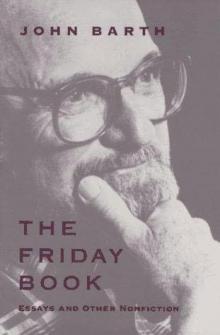 The Friday Book
The Friday Book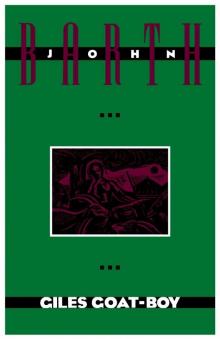 Giles Goat Boy
Giles Goat Boy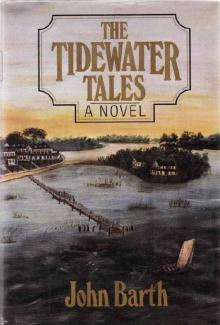 The Tidewater Tales
The Tidewater Tales The Development
The Development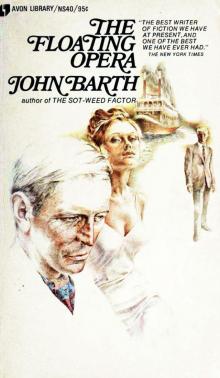 The Floating Opera
The Floating Opera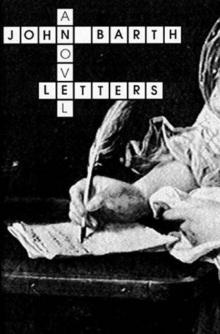 Letters
Letters Chimera
Chimera Where Three Roads Meet
Where Three Roads Meet Every Third Thought
Every Third Thought